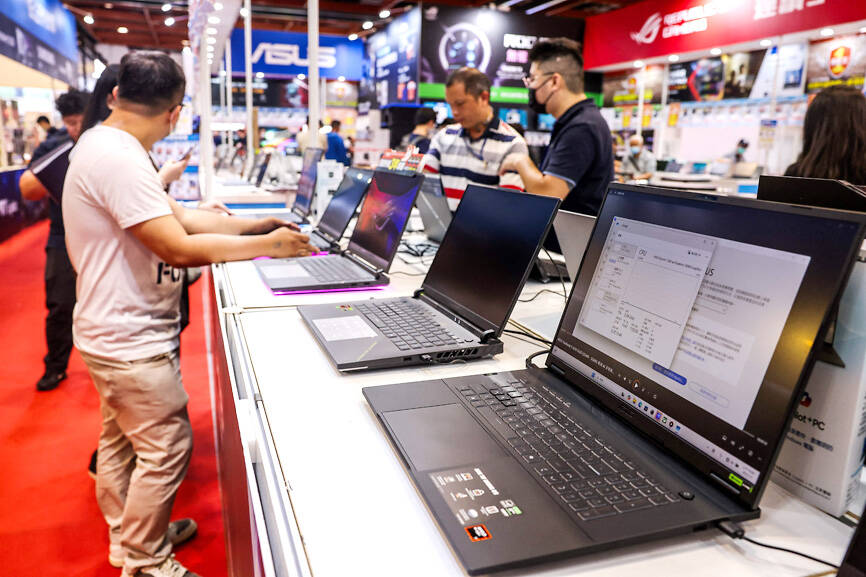The computer and information technology (IT) service sector’s revenue in the second quarter of this year increased 6.87 percent year-on-year to NT$155.58 billion (US$5.2 billion), the highest for the April-to-June period on record, the Administration for Digital Industries (ADI) said yesterday.
The growth was mainly driven by enterprises’ continued efforts in digital transformation and their increased investment in artificial intelligence (AI) applications and cloud services, the ADI said in a report.
“This trend has triggered corporate demand for technical services such as data processing and analysis, as well as information security enhancement, which in turn has contributed to revenue growth in system integration, consulting services, maintenance and operation management, and IT system upgrades,” the ADI said.

Photo: I-Hwa Cheng, AFP
The computer programming industry was the sector’s major sales growth driver, with revenue rising 8.59 percent to NT$114.06 billion in the second quarter, accounting for 73.31 percent of total revenue, boosted by large enterprises ‘ strong demand for services such as system upgrades, AI project planning and professional support, the report said.
The IT service industry’s revenue grew 2.41 percent to NT$41.52 billion, or 26.69 percent of the total. It was mainly due to enterprises’ robust demand for cloud services amid the AI boom, it said.
In the first half of this year, the computer and IT service sector’s revenue totaled NT$305.23 billion, up 6.01 percent over the same period last year, with computer programming and IT service industries growing by 8.22 percent and 0.5 percent, respectively, the report showed.

Handset camera lens maker Largan Precision Co (大立光) on Sunday reported a 6.71 percent year-on-year decline in revenue for the third quarter, despite revenue last month hitting the highest level in 11 months. Third-quarter revenue was NT$17.68 billion (US$581.2 million), compared with NT$18.95 billion a year earlier, the company said in a statement. The figure was in line with Yuanta Securities Investment Consulting Co’s (元大投顧) forecast of NT$17.9 billion, but missed the market consensus estimate of NT$18.97 billion. The third-quarter revenue was a 51.44 percent increase from NT$11.67 billion in the second quarter, as the quarter is usually the peak

Taiwan’s foreign exchange reserves hit a record high at the end of last month, surpassing the US$600 billion mark for the first time, the central bank said yesterday. Last month, the country’s foreign exchange reserves rose US$5.51 billion from a month earlier to reach US$602.94 billion due to an increase in returns from the central bank’s portfolio management, the movement of other foreign currencies in the portfolio against the US dollar and the bank’s efforts to smooth the volatility of the New Taiwan dollar. Department of Foreign Exchange Director-General Eugene Tsai (蔡炯民)said a rate cut cycle launched by the US Federal Reserve

The US government on Wednesday sanctioned more than two dozen companies in China, Turkey and the United Arab Emirates, including offshoots of a US chip firm, accusing the businesses of providing illicit support to Iran’s military or proxies. The US Department of Commerce included two subsidiaries of US-based chip distributor Arrow Electronics Inc (艾睿電子) on its so-called entity list published on the federal register for facilitating purchases by Iran’s proxies of US tech. Arrow spokesman John Hourigan said that the subsidiaries have been operating in full compliance with US export control regulations and his company is discussing with the US Bureau of

Pegatron Corp (和碩), a key assembler of Apple Inc’s iPhones, on Thursday reported a 12.3 percent year-on-year decline in revenue for last quarter to NT$257.86 billion (US$8.44 billion), but it expects revenue to improve in the second half on traditional holiday demand. The fourth quarter is usually the peak season for its communications products, a company official said on condition of anonymity. As Apple released its new iPhone 17 series early last month, sales in the communications segment rose sequentially last month, the official said. Shipments to Apple have been stable and in line with earlier expectations, they said. Pegatron shipped 2.4 million notebook